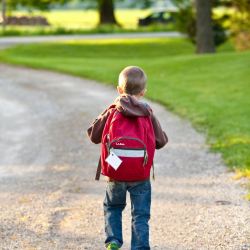Apparently, we are at a point where the Governor of Utah was compelled to sign into law bill SB65 which somewhat modifies the definition of child neglect. In an effort to make it more difficult to penalize parents who encourage self-reliance in our overly protective, often fear-driven culture, the newly amended legislation (which goes into effect May 8) permits a child “whose basic needs are met and who is of sufficient age and maturity to avoid harm or unreasonable risk of harm, to engage in independent activities.”
These include, but are not limited to the following (as stated in the bill, link here):
-
traveling to and from school, including by walking, running, or bicycling
-
traveling to and from nearby commercial or recreational facilities
-
engaging in outdoor play
-
remaining in a vehicle unattended, except under the conditions described in Subsection 76-10-2202(2) which stipulates many restrictions with respect to safety from not endangering them to endure hypothermia, hyperthermia, or dehydration to being intentionally reckless or criminally negligent by placing them at risk in enclosed compartments in vehicles etc.
-
remaining at home unattended
-
engaging in a similar independent activity
According to the Associated Press, the first-of-its-kind legislation was prompted by lawmakers observing investigations and temporary removal of kids from their homes in other states for playing sports in their yards or going to school while unattended. The achievement is being touted as a win for free-range parenting, a movement that arose to encourage autonomy as a counterbalance to the excessively scheduled and obsessively controlled child who is raised by the so-called helicopter parenting method. For a more extensive description, click here for my WebMD video on the subject.
The reality is childhood and parenting don’t need to be branded. But, like most things today, if they aren’t pre-packaged in this convenient, but often myopic way, then they will never see the light of day. The notion that there is a one-size-fits-all technique to raising a well-adjusted, independent, happy and thriving child is a pipe dream. It sounds quite lovely and makes many feel better when navigating the wondrous, adventure-laden and routinely stressful world of parenting.
Age limits are kept mostly vague so as to retain the emphasis on prosecutors and law enforcement of using a case-by-case basis to inform their decisions. It is this aspect that actually parallels what goes on in the world. There are children who are quite dutiful, responsible and capable of more than the standard expected of them at their numerical age. Nurturing this maturity is what affords them the opportunity for unlimited growth and development. Suppressing it, stifles their potential. Others fall quite short on this scale and require greater guidance and support. They need to be restricted accordingly, and there is no one who knows a child better than his parent. Another child might be able to be more autonomous but then regress due to situational impacts. What that child was once responsible doing, might no longer be in play.
Therefore, determinations of what is or isn’t safe is sub-optimally designed by an arbitrary guideline.
This notion that child development is static and binary is ill-informed. It is dynamic and fluid. Absolutes rarely get us very far in our understanding and facilitating of progress. There are moments where a responsible parent is being a helicopter even in the child who most of the time shines with free-range. Siblings warrant different styles and all kids require parental flexibility to be adaptable otherwise they will never learn to be. Adaptability is a huge component to acquiring coping skills and resilience which for ultimate life success is a fundamental, and should be, mandatory acquisition.
Life events occur compelling alterations in parental roles and behavior. Adjusting accordingly and assuming personal responsibility is what necessitates great parenting. When a parent leads by example and follows through with the consequences to their actions, there is no superior influence or lesson to be learned by a child. Continued abdication of this reality for the purposes of legislative and regulatory intensity or laxity misses the point.
Let the government govern. And parents parent. Both should work in harmony to advance the best interest and guarantee the safety of the child.

